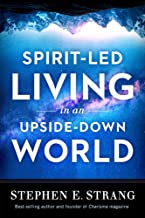Deliverance is not readily understood. Start a conversation about confronting demons, and some people will roll their eyes, saying you have gone too far out on a limb. A recent Barna survey found that more Americans believe in Satan than in God. This statistic solidifies the current debate concerning deliverance ministry and whether Christians should be concerned about demons.
Some will accuse you of looking for a demon under every rock. Others will tell you how they were scarred by a horrible experience when, desperate for answers, they submitted to deliverance ministry, only to have people encourage them to “vomit up” demons and do all sorts of strange things during a grueling “deliverance” session. Others will say they are experts in the deliverance field. Some Christians believe that raising the decibel level of their prayers will chase away more demons. They have a great desire to yell at the enemy, but they lack understanding of spiritual authority. They might scream at demons all day long with no results.

I have seen and heard much in the area of deliverance. While I know deliverance is sometimes handled poorly or even arrogantly, I do believe there is an aspect of spiritual warfare to many human problems. Paul clearly states this: “For the weapons of our warfare are not carnal, but mighty through God to the pulling down of strongholds, casting down imaginations and every high thing that exalts itself against the knowledge of God, bringing every thought into captivity to the obedience of Christ,” (2 Cor. 10:4-5). There are Christians who do not want to believe they can have demonic problems. I believe a problem that will not go away after prayer, positive confession, fasting, strong-willed determination or medical treatment must have a demonic basis that needs to be dealt with spiritually.
Problems that are hard to deal with such as rage, drug addiction and even sexual addictions or alcoholism, have, I believe, spiritual problems at their root. There may be strongholds in the mind and soul ties that must be dealt with, along with the sinful habit or behavior that is being acted out.
Let me give an important disclaimer. Some very odd behaviors are caused by some physical conditions that can be treated with medicine. I believe you should consult a doctor to rule this out as a possible cure. If the problem continues, then it may be spiritual in nature, and deliverance may help. On this point, you may agree or disagree with me. You may feel that deliverance is not central to the gospel or is a ministry that ended in Bible times. But if you look at the ministry of Jesus, the subject of deliverance is unavoidable. You bump into it again and again throughout the gospels. I firmly believe that His ministry is the same today as it was then—to save, heal, deliver and preach the gospel of the kingdom. To subtract deliverance from that equation, I believe, is to diminish the gospel.
Jesus certainly understands the need to extend deliverance to those who were “bound.” Many verses show us His response to the needs of the people who came to Him for help. Matthew 4:24 tells us the sick came to Him from many miles away: “And they brought to Him all sick people who were taken with various diseases and tormented with pain, those who were possessed with demons, those who had seizures and those who had paralysis, and He healed them.” Jesus instructed His disciples to drive out demons. In Luke 10:17, the 70 disciples are astonished that “even the demons are subject to us through Your name.” In Luke 4:36, the people see deliverance as a sign of great authority: “They were all amazed and said among themselves, ‘What a word this is! For with authority and power He commands the unclean spirits, and they come out.'”
Try to imagine the Gospels without deliverance, and you will see just how many times our Lord confronted demons and set people free. I firmly believe that it would be foolish, considering what we see in the Gospels, to exclude demonic activity entirely from the twenty-first century experience.
Stephen E. Strang is the bestselling author of God and Donald Trump. The founder and CEO of Charisma Media, Strang was voted by Time magazine as one of the 25 most influential evangelicals in America. He has interviewed four U.S. presidents and has been featured on Fox News, CNN, MSNBC, CBN, Dr. James Dobson’s Family Talk, theDailyCaller.com and in many Christian outlets.













